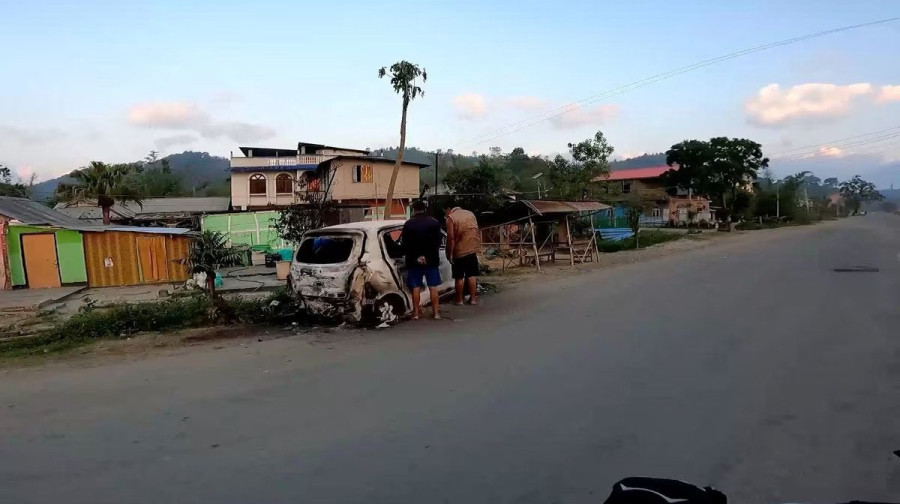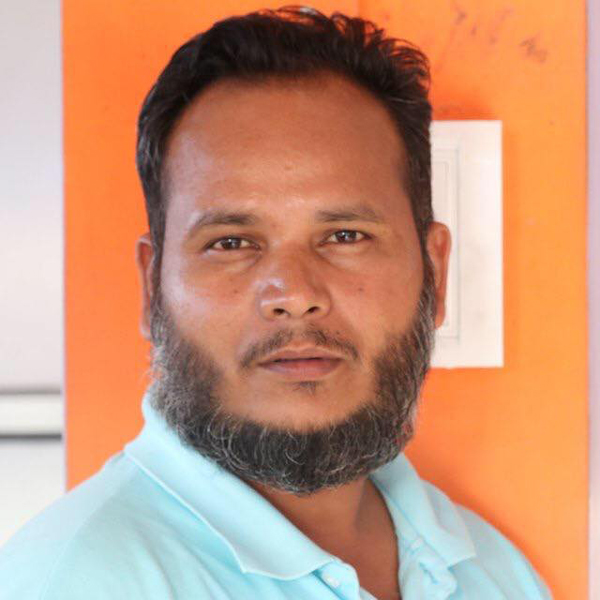National
Nepali-speaking Indians stuck in Manipur violence
Although Nepali-speakers are not targets of the fighting tribes, Romani Kumar Paudel was killed in crossfire this week.
Parbat Portel
Fifty-two-year-old Romani Kumar Paudel died of bullet injuries on Monday in Serou in the Indian state of Manipur in the Indian northeast, according to Laxman Adhikari, one of his relatives.
Paudel was caught in a crossfire during a communal violence that has taken a nasty turn since it started three weeks ago.
The Nepali-speaking community living in Manipur finds itself in a difficult situation with no escape from the violence-hit state.
The Nepali-speaking Indians have been caught in the violent protests between two ethnic communities—Meitei and Kuki. As the Meitei-Kuki violence continues, the Nepali-speaking people have become “hostages” to the situation, says Rahul Rai, a resident of Kanglatongbi in Manipur.
“So far Nepali-speaking people have not been targeted by the rival groups,” said Rai. “However, because of the ongoing violence, Nepalis are also feeling unsafe.”
The violence began on May 3 when tribal groups clashed with the ethnic majority Meitei people— a non-tribal group, over economic benefits and reservation quotas.
The tribal Kuki community has been protesting in the state after the government decided to include the dominant and politically stronger Meitei community under the Scheduled Tribe status, saying that it was unfair to give the status to the Meiteis.
The violence between Meitei and Kuki is intense in the hilly areas such as Serou, Kalapahad, Toribari, Noonpani, Mukuli, Chandraman, and Seti Khola among others, where the majority of the residents are Nepali speakers.
On Monday alone, the two protesting groups set fire to hundreds of houses of the rival communities in Manipur.
According to The Frontier Manipur, a local news website, six people including two security personnel were killed following gun fights in Sugnu and Fayend last Sunday.
The state’s chief minister, N Biren Singh, told the media that 40 ‘terrorists’ were killed in the encounter between security forces and armed rebels. Singh had labelled the protesters as terrorists.
The violence has left at least 80 people including civilians and security personnel dead and more than 200 injured, while over 40,000 people have been displaced and properties worth billions of rupees have been damaged.
Hom Bahadur Basnet, a local from the mountain village of Serou, said that the Nepali-speaking people from the village are hiding in dugouts to avoid being caught in the violence. “The Meiteis and the Kukis said that we might also face problems because of them so we have started hiding to save their lives,” said Basnet, in a phone conversation with the Post.
“The shootings between the security personnel and the agitating communities are getting worse every day,” said Basnet. “Most of the houses of both the Meitei and Kuki communities in the Serou area have been destroyed.”
Meanwhile, some people of the Nepali community are leaving their homes in the violence-affected areas due to fear and are heading to Kanglatongbi, a village in the Imphal West district, where Nepali-speaking people are in majority, for temporary shelter.
According to the Statistics Department of India, the population of Manipur is around 3.4 million. Of the total population of the state, Nepali speakers number around 50,000.
“However, for the past three decades, the population of Nepali speakers has been on a gradual decline,” said Bhim Koirala, a former resident of Manipur. “Nepali speakers of Manipur were already in minority and insecure and in recent times, outmigration has led to a further decline in their population.”
Koirala says that many Nepalis caught in the current violence are desperate to leave the region.
“They are staying there as all vehicular movement in and out of the state has been barred due to the ongoing protests.
Kamala BK of Imphal said that many Nepali-speaking people would leave Manipur as soon as transport is available. “Many of us are unable to leave as no public vehicles are operating due to the violence,” said BK over the phone. “We will leave Manipur once transport services resume.”
The Nepali-speaking community members who escaped violence in various Indian northeastern states in the past have found shelter in areas like Siliguri, Naxalbari, Bagdogra, and Khoribari among other areas of West Bengal state.
Manipur is a sensitive state in India where dozens of militant organisations are active. Even the Meitei and Kuki communities have separate armed militias.
Manipur is becoming more violent because of the clashes between these militias, says Dr Tankanath Khatiwada, Professor at Presidency College of Manipur.
“The Kuki community has been demanding a separate Kuki state within Manipur,” said Khatiwada.
Meanwhile, Indian Union Home Minister Amit Shah visited Manipur on Monday, almost three weeks after the outbreak of violence to hold talks with the protesting factions.
Following Shah’s visit, the agitating United People’s Front and the Kuki National Organisation issued separate statements and said they were optimistic about a positive outcome in talks mediated by the home minister.




 8.54°C Kathmandu
8.54°C Kathmandu















